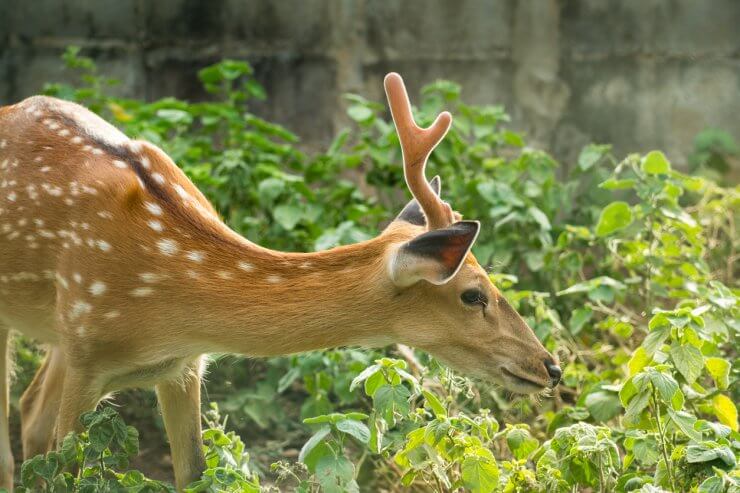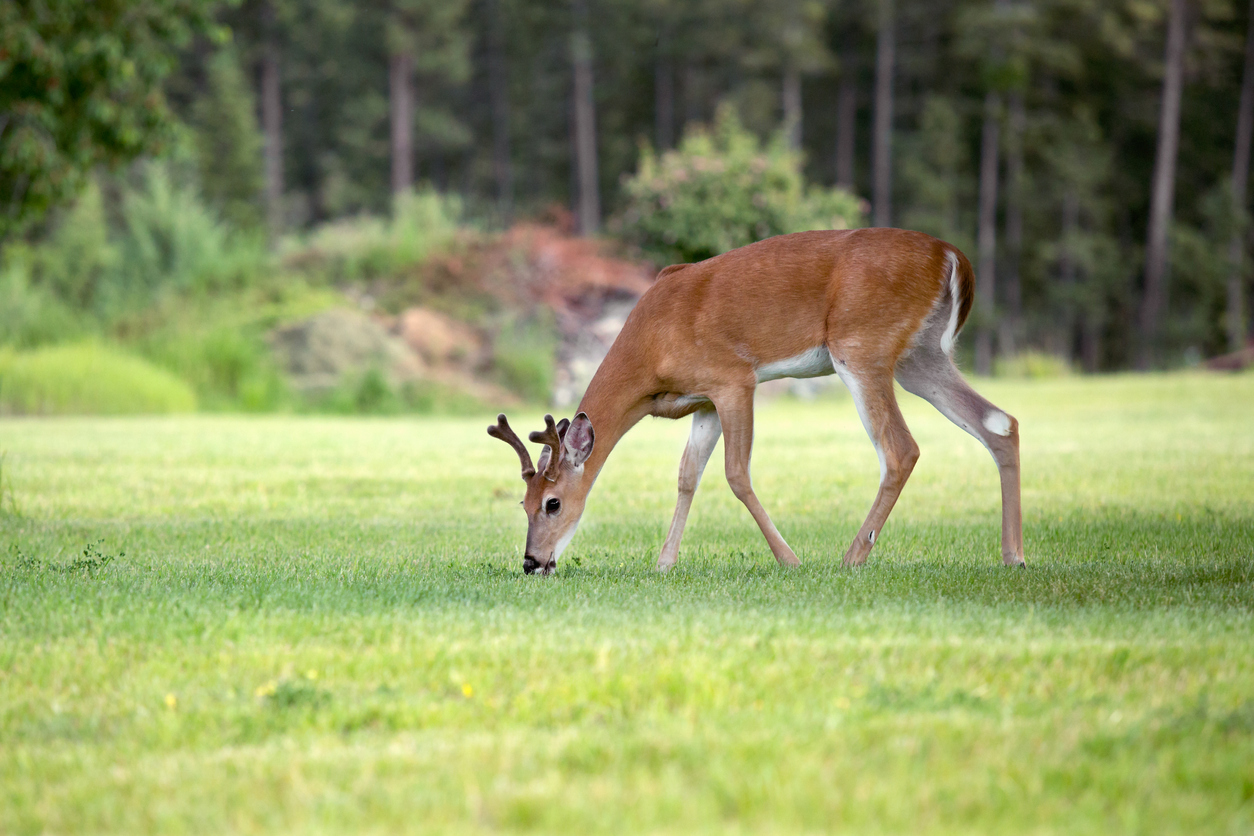
I love deer. They’re such graceful, beautiful creatures, and I love looking out of my window and seeing them stroll through the yard. However, I also love my garden and I’m always looking for new ways to keep deer from eating plants, herbs, and fruits.
Deer are resourceful and persistent when it comes to eating what they love. And outside of coyotes or bobcats (or alligators in the southeastern U.S.!), they don’t have many natural predators. That means, my gardening friends, that it’s up to us to keep deer from eating plants. Ready for the challenge?
Discover 7 top tips for growing, harvesting, and enjoying tomatoes from your home garden—when you access the FREE guide The Best Way to Grow Tomatoes, right now!

7 Natural ways to keep deer from eating plants in your garden
1. Use soap. Deer have an excellent sense of smell. And when it comes to your efforts to keep deer from eating plants, odor repellants are an inexpensive solution that tends to work well—the more strongly scented, the better if you go this route.
2. Get a haircut. Actually, you may need to get several haircuts. You smell like danger to a deer, so saving hair from haircuts and hanging it in nylon bags around your garden can be a potential deterrent. There are a few caveats here, however. You’ll need a lot of hair, as it loses its scent after a few weeks. You might need to make friends at your local hair salon or barbershop for this option.
3. Plant strongly scented herbs. Again, we’re looking at scents and odors as a way to keep deer from eating plants. In this case, plants like garlic, mint, sage, lavender, and others can mask the scent of more attractive munchies.
4. Try passive scare tactics. Hanging old CDs, ribbons, wind chimes, pinwheels, or other items that blow in the wind can have some impact on deterring deer. These aren’t guaranteed by any means. However, they can add some nice visual elements to your garden, and they’re pretty much free if you have them lying around, so there’s no reason not to try them.
5. Tie twine or fishing line around your garden. Don’t worry; this isn’t as difficult as it seems. You only need a border a few inches off the ground. Since deer can’t see the wire, they bump into it and run off because they think some potential predator is there.
6. Install motion-activated deterrents. Motion-activated deterrents are a great way to keep deer from eating plants. In fact, they will scare away deer, rabbits, skunks, and most other critters that want to feed on your peas and turnips. There are several kinds, from motion-activated lights to sprinklers to noisemakers. As you can imagine, these can run through a range of price points, effectiveness, ease of use, and so on. Sprinklers may be the most effective, as deer can get used to lights and sounds, but you run the risk of an over-watered garden if there is a lot of animal activity. Orbit products get good reviews.
7. A big ole’ fence. I’m putting this one last on the list because, quite frankly, it’s neither the easiest nor least expensive option. White-tailed deer can jump about eight feet high, meaning your fence would need to be that tall. Alternatively, a shorter fence can work, but, according to the University of Vermont, a shorter, “slanted fence should be at a 45-degree angle, and may consist of fencing with a few strands of additional wire on top for extra height.” One other option is to build a double row of fencing. In other words, while a tall, angled, or solid fence (so deer can’t see in) works well to keep deer from eating plants, it just might not be practical or attractive.
It’s worth noting that hungry deer may or may not be deterred by any of these methods. The fencing is perhaps your best option, but it’s also the most expensive and the most work. It’s certainly not for everyone, either. Personally, I don’t want a huge fence around my garden. I love to look out and see the plants growing.
That said, using several of these methods in conjunction with one another and changing them up occasionally may be the best way to keep deer from eating plants in your garden.
What methods have you found helpful in keeping deer away from your garden? I’d love to read your ideas in the comments.
Discover 7 top tips for growing, harvesting, and enjoying tomatoes from your home garden—when you access the FREE guide The Best Way to Grow Tomatoes, right now!





Here in Australia we don’t have the same problems that those of you in the US have, but we do have possums (Australian marsupial possums that is). One rather effective way of deterring them from eating the plants is to put some Neutrog Rapid Raiser in an old pair of pantyhose and lea
ve them near the plants. They don’t like the smell at all, and I don’t blame them as I believe rapid raiser is made from composting dead chickens from the poultry farms. Smells even worse that blood and bone fertiliser!
Kudos to everyone who grows veggies and other food! The best way to limit what deer eat from your garden is to ensure they have alternative food sources. If you have the space, provide them with plants native to your area, paying attention to those favored by deer. I use a local native plant nursery website to see what plants they like and don’t like and I use both in my naturalized back yard. If you don’t have the space for that, you can help maintain a naturalized area in your community. If your community doesn’t have one, ask them to create natural landscaping/wildlife habitat in local parks. With wolves, cougars, and other apex predators driven out, the deer population will be unsustainable. Culling the herds by hunting is important, but so is habitat for them. I’d rather see deer eat my plants than watch them starve.
I use RepellsAll that I buy in concentrate and use a gallon pump sprayer to do my 50+ hostas, some shrubs and some vegetable and fruit plants spread around my two-acre yard. It lasts a few weeks at least even through most rains, but then I reapply. One bottle of concentrate usually works for a season.
We went with the big ole fence option, but it was because we could not keep our neighbors “free range” chickens out of the garden. We found a 10′ x 10′ dog kennel that fit right around my keyhole garden and left me two feet of area to move on every side. Actually, I’m glad we finally found that after other attempts to keep our garden safe – we have deer, turkeys, rabbits, opossums, raccoons, and skunks living in our heavily wooded area. But we also have bear. If one show up, I can lock myself inside.
ROTTEN EGGS, DIRTY SOCKS AND SMELLY TENNIS SHOES KEEPS THEM FROM ENTERING….
ROTTEN EGGS DO THE JOB FOR ME…. ALSO A FEW PAIRS OF DIRTY SOCKS OR TENNIS SHOES WILL KEEP THEM FROM ENTERING
Put Milorganite in perforated used soda or juice bottles. Scatter in garden area . No more deer in garden. Inexpensive and it’s works .
I used “Deer Out” concentrate spray but you can easily make your own using egg, peppermint, garlic, a little soap and I think a little vegetable oil. IT WORKS. Since I’m busy I buy the concentrate because, while expensive $40 bottle) it lasts the entire season and often some left for next year. When I moved to our home in the woodlands of rural Pennsylvania, bordering a state park, my next-door neighbor said the woman who lived there used deer out, as does she. So I bought it and been using it for 7 years, it works perfectly. The only time I ever have deer damage if I don’t spray several weeks and have lots of rain. I know it works because everything I spray, they don’t touch. A few times I forgot one shrub and that’s the one they nibbled. I have a huge vegetable garden, fruit trees, berry bushes, hostas, and flowers. My garden fence is only about 4 1/2 feet high. You can look online how to make your own spray like this, I’ve seen many recipes, or you can buy it, I’m not advertising for them. Both options should be effective.
Get a dog! Preferably one who barks to protect the household.
There are different flower and shrubs that the deer don’t like the smell of but they have lovely flowers and they are perennials. It’s different for different areas, so ask ur local garden expert. I have to find some so they won’t eat my hosta’s again this yr.
I have a 5′ fence around my garden with wire hog panels in between the posts and raised beds inside the garden. In spite of the many deer bothering the rest of the yard, they have never been in my garden. I think the raised beds make them not want to risk jumping in.
The most helpful thing I tried was putting cayenne pepper or Tabasco on the plants the deer liked. Not fool proof either though as you have to keep applying after a rain or watering.
I used everything from mothballs; coyote blood that was bought from a hardware store, tin plates, a motion light, dog and human hair and a scarecrow. It worked for a short period of time. Last of all I put up a 8′ fence, that work for a few seasons. That was when a deer tried to jump over it, caught the netting and snapped off five of my post. My daughter’s boyfriend laughed at me for making my fence 8′ high. He had a 6′ fence around his. He got up to go to work and there was a doe inside the fence eating his garden and a big buck outside the fence. He wasn’t very long putting up an extra 2′ higher around his garden. Karma did come around and nip him in the butt.